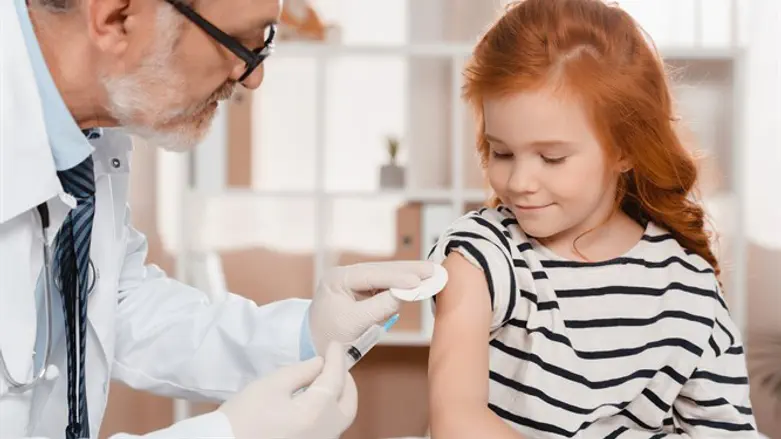
Israel's Health Ministry on Wednesday evening will hold a meeting to decide whether to recommend vaccinating children ages 5-11 against coronavirus.
Following the threats to Head of Public Health Services Dr. Sharon Alroy-Preis, the discussion will not be held publicly, and the recommendations and reasoning behind them will be published after the discussion.
Israel Hayom spoke with Dr. Tal Brosh, Head of Infectious Disease Unit at Assuta Ashdod University Hospital and coordinator of the Staff for Management of Pandemics, who discussed the importance of vaccinating children, the threats from anti-vaxxers, and what Israeli parents can expect in the coming weeks.
"In my estimation, they will indeed recommend vaccinating children," Dr. Brosh said. "We saw that the FDA and CDC recommended it. The Health Ministry's stance is positive, and the stance of the Israel Pediatric Association is positive. In my estimation, the vast majority will be in favor."
"Among the dilemmas we will discuss is the issue of vaccinating children with positive serology. In Pfizer's research there was a certain percentage of recovered children, and this gives us safety information on children who recovered and were vaccinated. The benefit from the vaccine for those recovered is smaller."
Israel Hayom asked Dr. Brosh, "What can you tell parents who read an article by a doctor who said that coronavirus is not a serious illness in children, and that the vaccine does not prevent PIMS after coronavirus?"
"The article is well-written, but she makes absolute statements which are very imprecise," Dr. Brosh told Israel Hayom. "This is an incorrect analysis of the data. Obviously, coronavirus is a lot less dangerous in children than it is in adults, but the data from Israel, which is similar to the data from the US, shows that the frequency of PIMS is 1 in 3,000 children who are infected, and the chance of hospitalization with serious illness from coronavirus is one in 1,000."
"I think the doses of the vaccine intended for children should arrive in Israel any day," he said. "The moment the Staff for Management of Pandemics issues a recommendation, the Ministry's regulatory role in approving it will be very quick."
The central question to be brought for a vote on Wednesday evening will be whether the staff recommends that the Health Ministry vaccinate children ages 5-11.
"I am one of those who thought from the outset that it is incorrect to hold staff meetings on live broadcast," he said. "I am not sorry for what we did last week. I understand the public's desire, and that of the media, to watch the discussions live."
Wednesday's meeting will not be made public, "mostly due to concerns that it will create shallow discussions. The moment you know you're on tape, there are people who will not want to participate."
"The subject of the Green Pass is at the operational level of the Ministry. If the State thinks it is appropriate to vaccinate, it needs to do everything it can to convince the citizens."
When asked how many parents are expected to vaccinate their children, Dr. Brosh said, "I estimate that there will be a rush with a large number of parents who are very much waiting for the vaccine, and that will be over relatively quickly, but in my estimation, we won't reach 50%. Vaccinating children will not eliminate the pandemic in Israel, and at the end of the day there will be repeat waves of infection, and everyone will be exposed, sooner or later, to the virus."
"We don't yet have answers" on whether children will need boosters, he said. "We will follow their antibody levels."
When asked if he had received threats from anti-vaxxers, Dr. Brosh said, "The issue of threats and the personal risk to members of the staff are very significant. We are not elected officials."
"I feel bad for Dr. Sharon Alroy-Preis, who is receiving threats, and that's horrific. I personally received threats, and since then I don't check social media. Very rarely do I look at comments, and it's horrific. They call me a 'criminal,' say I'm 'receiving money from Pfizer,' a 'child murderer.' I don't feel that my life is threatened, but I am worried that it might be that a person will decide that he's going to get up and do something, and take violent action, even against me."
